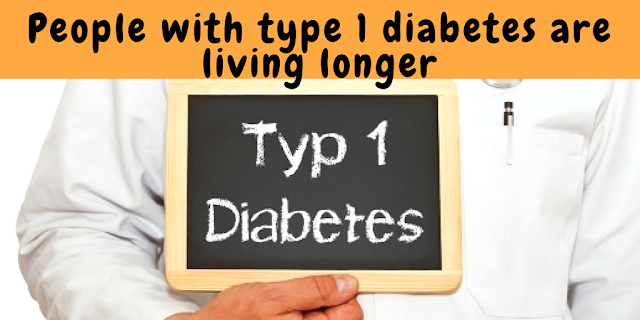People with type 1 diabetes are living longer. Can I have a normal life with diabetes?
June 06, 2017
Foodviki
Tweet
Follow
Tweet


Foodviki
TweetFollowTweet




Type 1 diabetes happens when your immune
system destroys cells in your pancreas called beta cells. They’re the ones that
make insulin. Type 1 diabetes is not linked to modifiable lifestyle factors.
There is no cure and it cannot be prevented.
What Does Insulin Do?
Insulin is a hormone that helps move sugar,
or glucose, into your body's tissues. Cells use it as fuel.
What Causes It?
Doctors don't know all the things that lead
to type 1 diabetes. But they do know your genes play a role.They also know type 1 diabetes can result
when something in the environment, like a virus, tells your immune system to go
after your pancreas. Most people with type 1 diabetes have signs of this
attack, called autoantibodies. They’re present in almost everyone who has the
condition when their blood sugar is high.Type 1 diabetes can happen along with
other autoimmune diseases, like Grave's disease or vitiligo.
What Are the Symptoms?
These are often subtle, but they can become
severe. They include:
- Heavy thirst
- Increased hunger (especially after eating)
- Dry mouth
- Nausea and vomiting
- Pain in your belly
- Frequent urination
- Unexplained weight loss (even though you’re
eating and feel hungry)
- Fatigue (weak, tired feeling)
- Blurred vision
- Heavy, labored breathing (your doctor will
call this Kussmaul respiration)
- Frequent infections of the skin, urinary
tract, or vagina
- Signs of an emergency with type 1 diabetes
include:
- Shaking and confusion
- Rapid breathing
- Fruity smell to your breath
- Pain in your belly
- Loss of consciousness (rare)
How Is It Diagnosed?
If your doctor thinks you have type 1 diabetes,
he’ll check your blood sugar levels. He may test your urine for glucose or
chemicals your body makes when you don’t have enough insulin. Right now there’s
no way to prevent type 1 diabetes.
How Is It Treated?
Many people with type 1 diabetes live long,
healthy lives. The key to good health is to keep your blood sugar levels within
the range your doctor gives you. You’ll need to check them often and adjust
insulin, food, and activities to make that happen.
All people with type 1 diabetes must use insulin
injections to control their blood sugar.When your doctor talks about insulin,
he’ll mention three main things:
"Onset" is the length of time
before it reaches your bloodstream and begins lowering blood sugar.
"Peak time" is the time when
insulin is doing the most work in terms of lowering blood sugar.
"Duration" is how long it keeps
working after onset.
Type 1 diabetes requires treatment to keep
blood sugar levels within a target range. Treatment includes:
- Taking several insulin injections every day
or using an insulin pump.
- Monitoring blood sugar levels several times a
day.
- Eating a healthy diet that spreads
carbohydrate throughout the day.
- Regular physical activity or exercise.
Exercise helps the body to use insulin more efficiently. It may also lower your
risk for heart and blood vessel disease.
- Regular medical checkups. You will get
routine screening tests and exams to watch for signs of complications, such as
eye, kidney, heart, blood vessel, and nerve diseases.
- Not smoking.
- Not drinking alcohol if you are at risk for
periods of low blood sugar.
- Blood sugars are easier to predict and
control when mealtimes, amounts of food, and exercise are similar every day. So
getting into a daily routine helps a lot.
Type 1 Non-Insulin Therapies
Pramlintide (Symlin)
Pramlintide is an injected medicine for
people with type 1 and type 2 diabetes that helps control blood sugar levels
after eating. Pramlintide resembles the hormone, amylin that is normally
released along with insulin from the pancreatic beta cells. In type 1 diabetes,
amylin levels are absent because the pancreatic beta cells have been destroyed.
Pramlintide lowers glucagon during a meal,
slows food emptying from the stomach and curbs the appetite.
Side Effects
Some people get certain side effects (such as
nausea, vomiting and low blood sugar) when starting pramlintide, therefore the
starting dose is small to allow the body to adjust to this new medicine.
Dosing
When you have type 1 diabetes, the initial
dose of pramlintide is 15 micrograms (2.5 units on the insulin syringe), taken
before meals. After 3 days, if you tolerate the medicine, the dose may be
increased to 30 micrograms (5 units on the insulin syringe) before meals. The
dose can be increased every three days as tolerated to a maximum dose of 60
micrograms before each meal. The meal must contain at least 30 grams of
carbohydrate. Pramlintide is available in a vial and pen form.
When you are starting pramlintide:
Reduce your mealtime insulin dose by half or
more to prevent a low blood sugar. Ask your medical provider for exact
recommendation.
If using an insulin pump, extending the meal
bolus to 1 ½ or 2 hours may prevent early post meal hypoglycemia and late post
meal hyperglycemia related to the delayed stomach emptying.
Inject pramlintide at the same time you
inject insulin, but at a different injection site.
Do not mix pramlintide with insulin in the
same syringe.
The most common side effects are:
- Nausea
- Vomiting
- Headache
- Low blood sugar
If you have side effects, contact your
medical provider immediately.
What Happens Without Treatment?
If you don’t keep your type 1 diabetes well
controlled, you could set yourself up for serious or life-threatening problems:
Retinopathy. This eye problem happens in
about 80% of adults who have had type 1 diabetes for more than 15 years. It’s
rare before puberty no matter how long you’ve had the disease. To prevent it --
and keep your eyesight -- keep good control of blood sugar, blood pressure,
cholesterol, and triglycerides.
Kidney damage. About 20%
to 30% of people with type 1 diabetes get a condition called nephropathy. The
chances grow over time. It’s most likely to show up 15 to 25 years after the
onset of diabetes. It can lead to other serious problems like kidney failure
and heart disease.
Poor blood circulation and nerve damage. Damaged
nerves and hardened arteries lead to a loss of sensation in and a lack of blood
supply to your feet. This raises your chances of injury and makes it harder for
open sores and wounds to heal. And when that happens, you could lose a limb.
Nerve damage can also cause digestive problems like nausea, vomiting, and
diarrhea.
Can I have a normal life with diabetes?
Yes, you can live a normal life. Remember,
many successful athletes and members of all professions have type 1 diabetes.
You can stay healthy if you control your diabetes. Only you have the power to
control it.
Living with type 1 diabetes
Insulin can be a difficult drug to manage. A
mismatch between insulin and food intake can cause blood sugar to drop
dangerously low (hypoglycemia). This can lead to symptoms such as a fast heart
beat or feeling shaky. It can cause diabetic ketoacidosis, in which the body’s
chemical balance becomes deranged because there’s not enough insulin to move
sugar into cells.
Hypoglycemia can also lead to a diabetic
coma, and even death. In the Scottish study, 21% of deaths among younger people
(under age 50) with type 1 diabetes occurred as a result of diabetic coma and
related causes.
That said, insulin works very well for most
people with type 1 diabetes. Other reasons why people with type 1 diabetes are
now living longer include:
Better insulins are available, and they are
easier to use. Some last all day, others work very quickly. Insulin pumps make
it easier to deliver insulin
Better ways to track blood sugar with home
glucose monitors and even continuous glucose monitors. Keeping blood sugar
close to normal is linked with longer life.
New drugs and other therapies to prevent and
treat complications of diabetes, such as heart disease and kidney disease. Both
are major causes of early death in people with type 1 diabetes.
Diabetes means your blood glucose, or blood
sugar, levels are too high. With type 1 diabetes, your pancreas does not make
insulin. Insulin is a hormone that helps glucose get into your cells to give
them energy. Without insulin, too much glucose stays in your blood. Over time,
high blood glucose can lead to serious problems with your heart, eyes, kidneys,
nerves, and gums and teeth.























0 comments